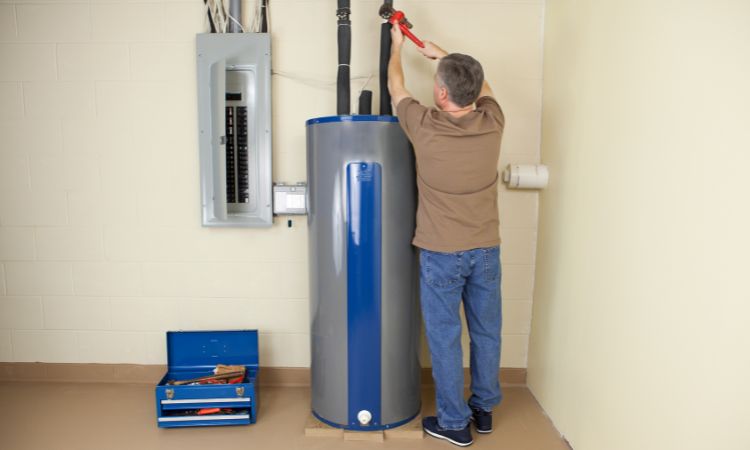Exploring Guide To Of Common Problems
Exploring Guide To Of Common Problems
Blog Article
Just about every person has their unique rationale involving Common Problems with Tank Water Heaters.

Imagine beginning your day without your routine warm shower. That already establishes a poor tone for the rest of your day.
Every residence needs a trustworthy hot water heater, but just a few understand just how to take care of one. One easy way to keep your water heater in leading form is to look for mistakes regularly and fix them as soon as they show up.
Bear in mind to shut off your water heater before smelling around for mistakes. These are the hot water heater mistakes you are most likely to run into.
Water too warm or also cold
Every hot water heater has a thermostat that figures out how hot the water gets. If the water entering your residence is also warm despite setting a practical maximum temperature, your thermostat may be damaged.
On the other hand, also cold water might result from a fallen short thermostat, a busted circuit, or inappropriate gas circulation. For instance, if you utilize a gas water heater with a broken pilot burner, you would certainly obtain cold water, even if the thermostat remains in best condition. For electrical heating systems, a blown fuse may be the culprit.
Not enough warm water
Hot water heater come in numerous dimensions, depending upon your hot water needs. If you run out of warm water before every person has had a bathroom, your hot water heater is too small for your family size. You ought to take into consideration mounting a bigger water heater tank or choosing a tankless water heater, which uses up much less room and also is extra durable.
Strange noises
There are at the very least 5 sort of sounds you can learn through a hot water heater, yet one of the most typical interpretation is that it's time for the hot water heater to retire.
To start with, you need to be familiar with the normal seems a hot water heater makes. An electric heating system might seem different from a gas-powered one.
Standing out or banging noises usually mean there is a slab of debris in your tanks, and it's time to clean it out. On the other hand, whistling or hissing audios might just be your valves allowing some stress off.
Water leaks
Leaks can come from pipes, water links, valves, or in the worst-case scenario, the container itself. Gradually, water will wear away the container, and discover its way out. If this takes place, you need to change your water heater asap.
However, prior to your change your entire storage tank, be sure that all pipelines are in location which each valve works flawlessly. If you still need help recognizing a leakage, call your plumber.
Rust-colored water
Rust-colored water means one of your water heater components is rusted. Maybe the anode pole, or the tank itself. Your plumber will be able to identify which it is.
Lukewarm water
No matter how high you set the thermostat, you won't get any type of hot water out of a heating unit well past its prime. A water heater's efficiency may reduce with time.
You will certainly additionally obtain lukewarm water if your pipes have a cross connection. This means that when you activate a faucet, hot water from the heating system flows in along with routine, cold water. A cross connection is very easy to area. If your hot water taps still pursue shutting the water heater shutoffs, you have a cross link.
Discoloured Water
Rust is a significant source of filthy or discoloured water. Deterioration within the water storage tank or a failing anode rod can trigger this discolouration. The anode pole safeguards the container from rusting on the inside and also should be inspected annual. Without a rod or an effectively functioning anode pole, the warm water quickly rusts inside the container. Contact an expert water heater specialist to establish if changing the anode rod will repair the issue; if not, change your hot water heater.
Conclusion
Ideally, your water heater can last 10 years prior to you require an adjustment. Nonetheless, after the 10-year mark, you might experience any one of these faults a lot more consistently. Now, you need to include a brand-new water heater to your budget.
How To Troubleshoot 3 Common Water Heater Problems in Twin Cities
The Water Heater Is Leaking
A leaky cold water inlet valve A loose pipe fitting A leaky temperature and pressure relief valve A corroded anode rod A cracked tank Turn Off Your Water Heater:
Shut off your gas water heater by turning the gas valve on the unit to the “OFF” position. Shut off your electric water by switching its power off at your electrical panel. Look for a two-pole breaker labeled “water heater” and turn it to the “OFF” position. Move the ball valve connected to the water heater to be perpendicular to the piping at a 90° angle. Look for the Leak:
Depending on whether the water is coming from the tank's top or bottom, you’ll want to look for the leak in different locations.
If the leak comes from the top of the tank, carefully look for water escaping from the cold water inlet valve or loose pipe fittings. Rusted hot and cold water valves can have loose connections with the tank, with water leaking out of them.
https://mspplumbingheatingair.com/blog/how-to-troubleshoot-3-common-water-heater-problems
I have been very enthusiastic about Common Problems with Tank Water Heaters and I hope you enjoyed reading the blog entry. Do you know about someone else who is excited about the topic? Why not share it. We truly appreciate reading our article about Water Heaters Problems.
For best results, ring! Report this page